Balancing a healthy lifestyle can be challenging with busy schedules, endless food choices, and a growing emphasis on wellness.
Whether you’re already in the wellness, lifestyle or fitness industry and want to expand your services or you’re passionate about nutrition, nutrition coaching can be a great opportunity to make a meaningful impact and build a successful business.
In this guide, we’ll discuss the essential steps to becoming a nutrition coach, from education to launching a successful business.
What Does a Nutrition Coach Actually Do?
As a certified nutrition coach, your goal is to help clients better their relationship with food to reach their health and wellness goals via nutrition.
Nutrition coaching can be broken down into three levels of expertise: food, people, action plan.
Food: Nutrition Knowledge
Knowledge of nutritional science is important to provide safe and effective guidance to your clients.
Here are some key areas of expertise you’ll need to gain:
- Macronutrients and Micronutrients: Understanding proteins, carbohydrates, and fats, their functions, recommended intake, and how to create balanced meals with essential vitamins and minerals.
- Digestion & Metabolism: How the body processes and absorbs nutrients, the role of metabolism in weight management and energy balance, the gut microbiome’s impact on health, and methods for assessing body composition to develop effective nutrition plans.
- Nutritional needs for different populations: Specific considerations based on age, gender, activity level, and health conditions (such as dietary restrictions, pregnancy, and more).
- Habit formation: The psychology behind eating behaviors, such as emotional or stress eating, and strategies for sustainable behavior change.
- Meal planning: Developing balanced meal plans, identifying unhealthy restrictions, interpreting food labels, and determining optimal meal timing and portion sizes.
Whether you learn about nutrition formally or informally, you need to have a solid understanding of the science behind food and our bodies to become a nutrition coach.
People: Behavior Change
Nutrition coaches work with many people with specific needs, habits, schedules, and emotions. It’s your job to empower them to make the necessary changes to reach their goals.
Spending time with your clients to understand psychological factors will shape the advice you give them and be the basis of what makes your action plan successful and your service memorable.
You want to help your clients, identify health priorities, build lasting habits and offer them support throughout the entire process.
Anyone can download an app to track their macros or count calories; what will separate your service from the latest meal-tracking app is empathy and personalization.
Action Plan: Meal Plans & Support
This is where nutrition coaches turn their expertise into a service. They assess clients’ needs, educate them, and help them make sustainable, long-term changes to their nutritional habits.
Here’s what a general service for a nutrition coach looks like:
- Initial consultation & goal setting: Set up a call to understand your client’s habits, challenges, needs, health history and dietary preferences. Make this call more effective by asking your clients to fill out a self-evaluation form beforehand.
- Create a nutrition plan: Design a meal plan tailored to your client’s needs. This is where you provide guidance on creating well-rounded meals, portion sizes, and meal timing. You can also recommend helpful tools like a compact cold press juicer
to make it easier for clients to incorporate fresh, nutrient-rich juices into their daily routine. - Ongoing support: Include check-ins via calls, email, or messaging to give your clients the chance to give feedback, review their progress with you while you provide additional resources, and offer motivation and encouragement. Even simple customer relationship management goes a long way.
Education Requirements for Nutrition Coaches
You may be wondering what learning background you need for nutrition coaching.
First, let’s clarify one thing.
A certified nutrition coach is different from a registered dietitian (RD).
A certified nutrition coach needs a strong foundation in nutrition science and health and wellness to help clients with nutritional education, behavior changes, and meal planning. These can be obtained through various certification programs.
Whereas a registered dietitian is a licensed healthcare professional and needs a formal degree to provide medical nutrition therapy, like diagnosing and treating diabetes or food allergies.
To become a nutrition coach, it is recommended to obtain a certification. This is the fastest and most recognized way to become a nutrition coach.
Now, we’ll discuss the top nutrition certifications and how to pick one.
Top Nutrition Coaching Programs Compared
Below are the most reputable programs for becoming a certified nutrition coach.
Precision Nutrition Level 1 Certification
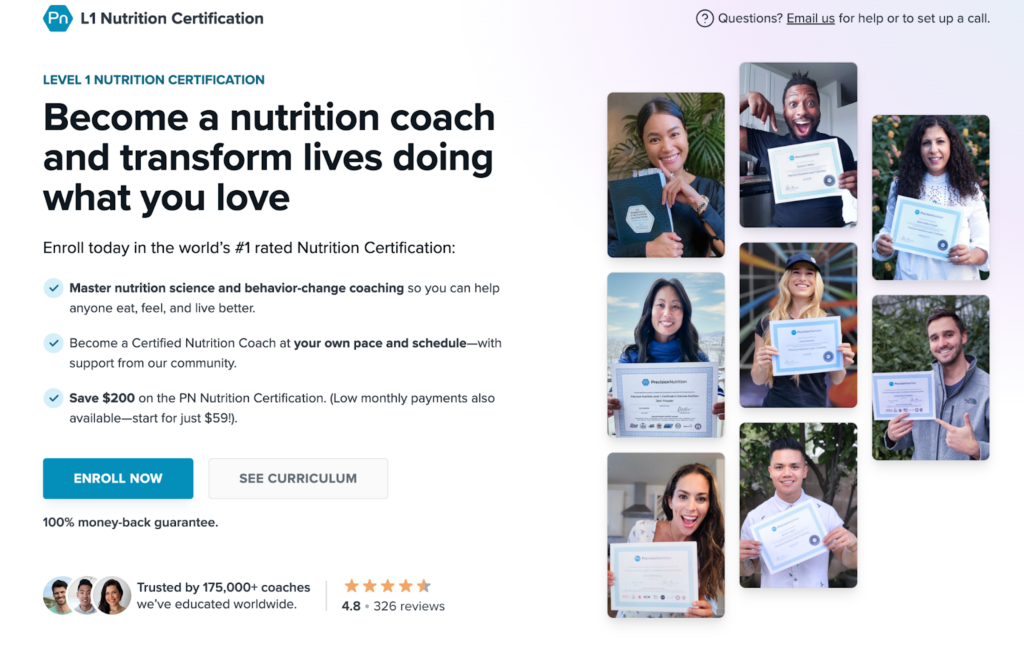
This well-rounded program focuses on nutrition science, behavioral psychology, and coaching practices. It also includes continuing education units in collaboration with other accredited organizations.
- Cost: $799 or $70/month
- Timeline: ~20 weeks, self-paced.
NASM’s Certified Nutrition Coach (CNC)
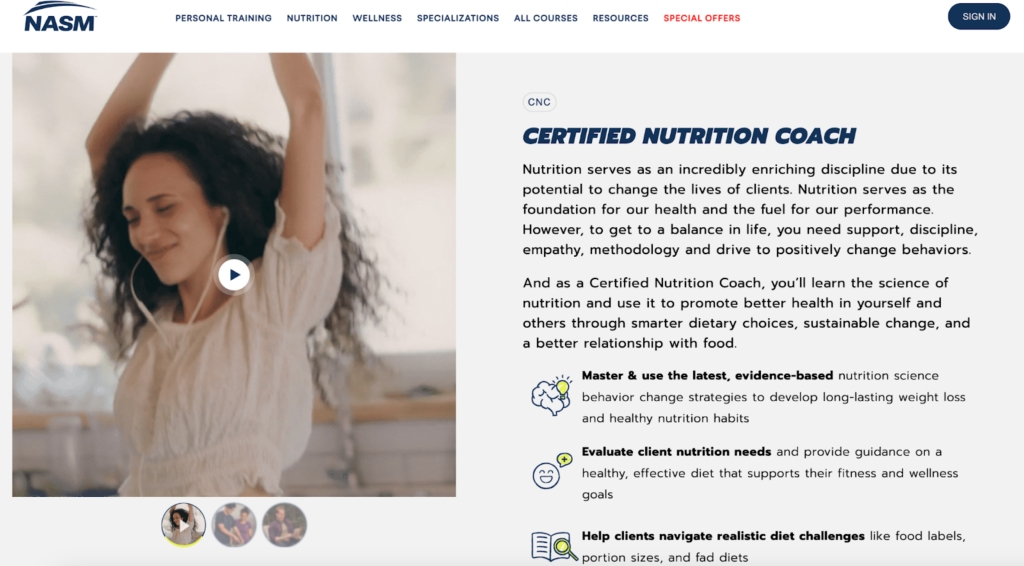
NASM’s Certified Nutrition Coach (CNC) is designed for health and fitness professionals, personal trainers, and those looking to become certified sports nutrition coaches. It also covers the basics of nutrition science and coaching principles and offers a dedicated Certified Sports Nutrition Coach Program.
- Cost: $899 or $70/month
- Timeline: ~10 weeks, self-paced.
AFPA Nutrition Certifications
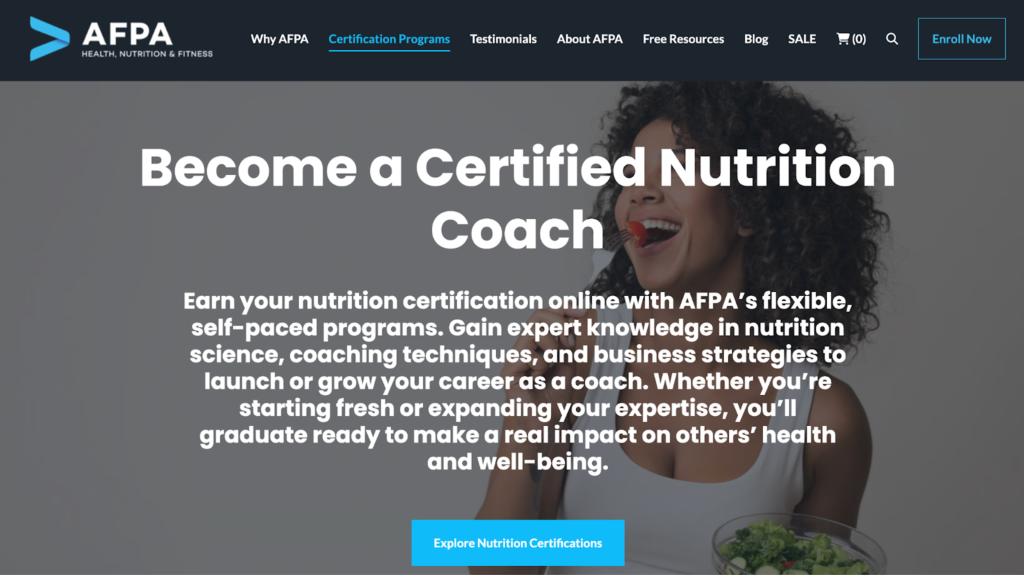
AFPA offers specialized programs like holistic nutrition, sports nutrition, gut-health nutrition, plant-based nutrition, and more.
- Cost: $699-$2,399. Can be paid monthly
- Timeline: Up to 6 months, self-paced.
ISSA Nutritionist Certification
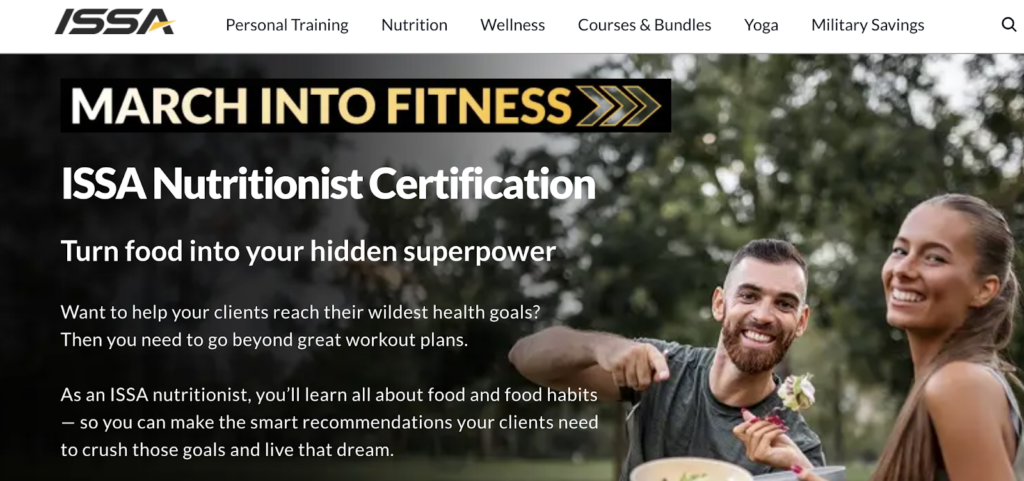
ISSA provides a General understanding of nutrition science and the business of nutrition coaching.
- Cost: $799 or $66.58/month
- Timeline: ~10 weeks, self-paced.
Nutritional Coaching Institute Certification
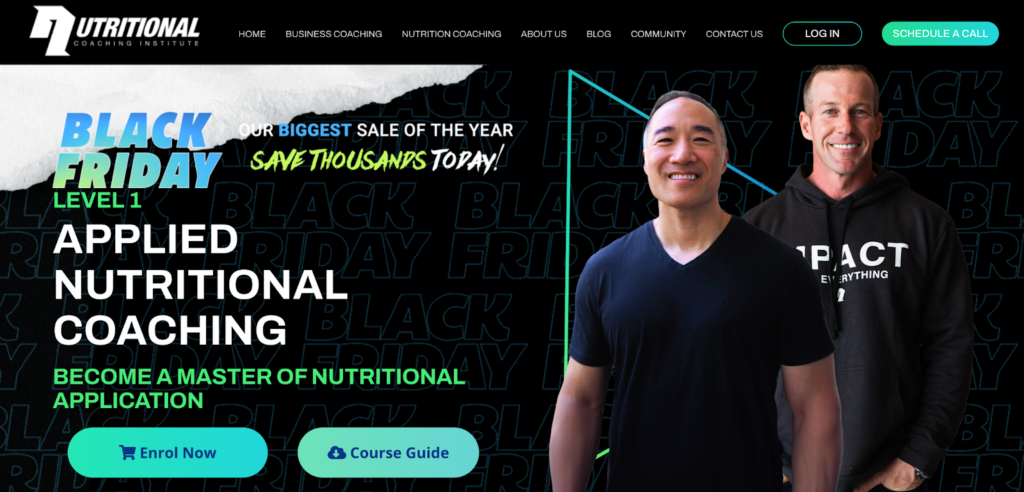
The Nutritional Coaching Institute Certification focuses on a scientific approach focusing on metabolism and hormones.
- Cost: $1,297 – $1,388. Can be paid over four months.
- Timeline: Self-paced.
By being a certified nutrition coach, you’ll gain knowledge to confidently coach nutrition and credibility with your future clients and professional organizations or employers.
5 Steps to Launch Your Nutrition Coaching Business
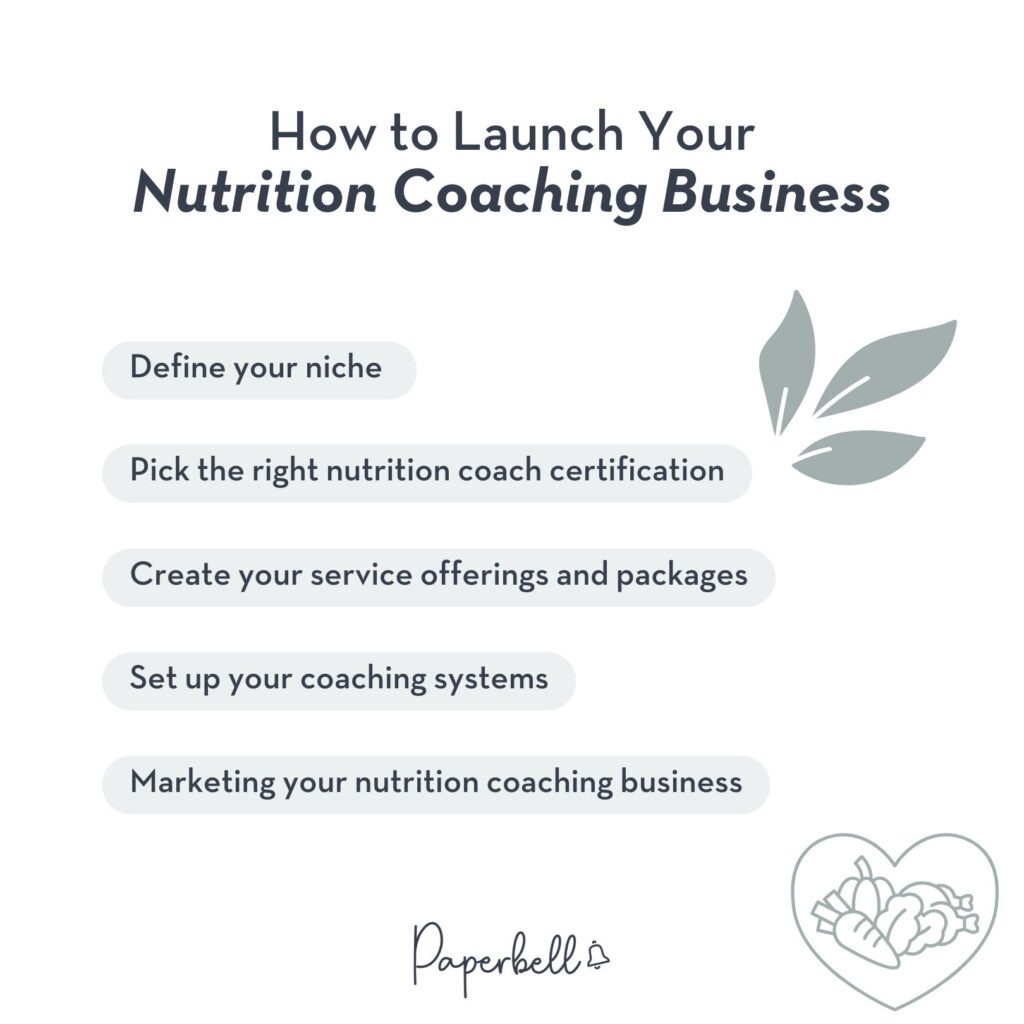
Now, let’s talk about how you can run a profitable nutrition coaching business.
- Define your niche
Define what your ideal client looks like. This is important to be able to pick a program with the specialty you’re looking for, have impactful messaging that resonates with your ideal client, and stand out in the industry.
There are many ways to niche down your specialty. You could focus on a type of audience (i.e., athletes, postpartum moms, busy professionals), dietary approach (i.e., plant-based), or goal-specific (i.e., weight loss).
- Picking the right nutrition coach certification
There are several factors to consider when choosing the right certification for you:
- Specialization: Choose a nutrition coaching program that aligns with your career goals. Evaluate whether you want a specialized or general certification. For example, if you want to work with athletes, you should focus on sports nutrition.
- Accreditation: Pick a reputable organization for your certification to add credibility and increase your chances of acquiring clients and employment.
- Learning style & time commitment: Consider how you liked to learn. Pick a program that keeps you engaged, motivated, and fits your timeline and learning pace.
- Create your service offerings and packages
While one-off sessions are a good way to get paid an hourly rate and work with clients that are less structured or need minimal support, the real money is in setting up packages.
You can create tiered packages and plans for your nutrition coaching service that offer different levels of support at varying prices.
Differentiate your tiers by short-term or long-term nutrition coaching (i.e., 1-month, 3-month, and 6-month coaching with weekly check-in sessions), access to a community, and short vs. long-term meal plans.
If you have other coaching expertise, such as in fitness, wellness, or lifestyle, you can tier plans by adding nutritional coaching to higher-tiered plans.
- Set up your coaching systems
The best way to set up your nutrition coaching business is to find an all-in-one coaching platform that makes it easy for you to sell your service online.
This means using a platform that:
- Lets you build and launch a coaching website and custom landing pages.
- Accept online payments seamlessly.
- Allows for easy scheduling.
- Helps you sell tiered plans.
- Has a built-in client management tool.
- Offers an intuitive client portal.
- Includes a content delivery function.
That way, you can focus on doing what you do best: coaching while offloading the stress of managing multiple tools and a long list of admin tasks.
Bonus points if the platform includes features like:
- A built-in contract e-signature tool.
- Ability to host live streams and group coaching sessions.
- Content drip, where you can schedule content to be available ahead of time.
- Native survey or form-creating function.
This way, your coaching platform can offer a personalized experience for your clients that streamlines your business and allows you to save time and effort on tedious tasks.
Paperbell is an all-in-one coaching platform that makes it simple to sell coaching online, with all the built-in tools needed to make your coaching service stand out, easy to use, and easy to manage.
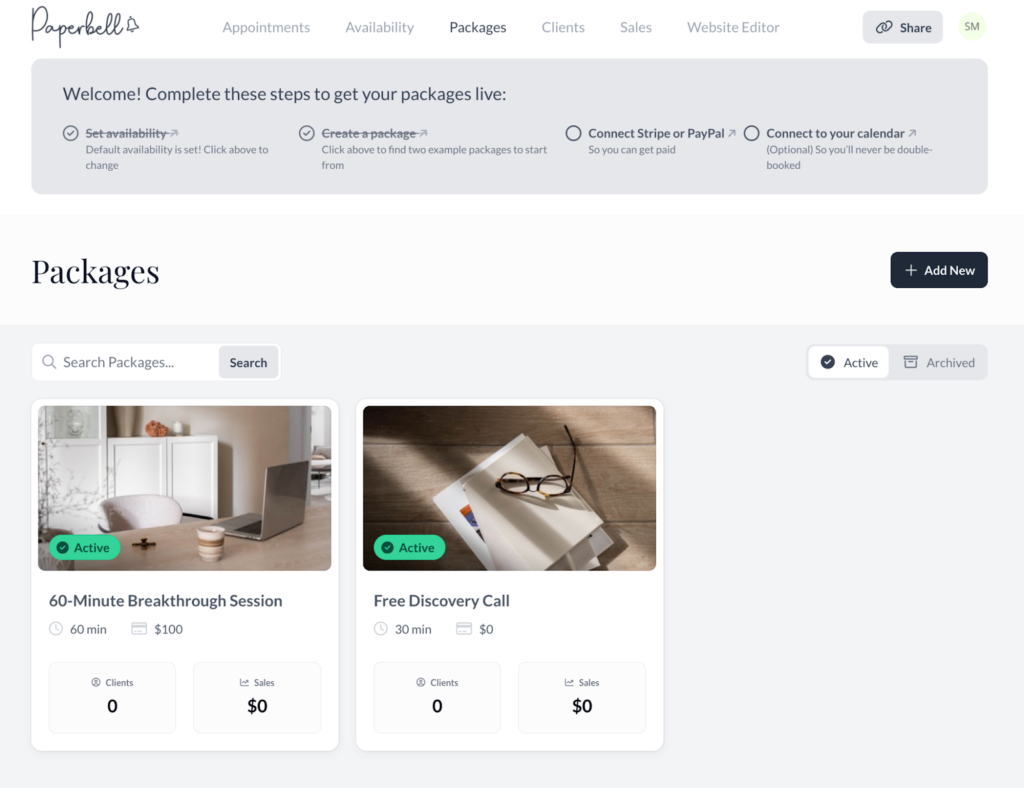
Paperbell has helped coaches in all niches generate over $47 million dollars to date, from mental health and business coaching to wellness and integrative life coaching.
- Marketing your nutrition coaching business
We know that marketing can get overwhelming, so here are two proven marketing strategies to get coaching clients:
- Social media: As a nutrition coach, the best way to get clients is through social media. Build a following on social platforms where your clients will be (like Instagram, TikTok, Facebook, YouTube and even LinkedIn).
Here are some content ideas that will help you build trust and credibility with your audience:
- Educational Posts: Break down nutrition myths, share healthy meal swaps, or explain the benefits of key ingredients in your recipes.
- Client Success Stories: With your client’s consent, share before-and-after transformations, testimonials, or client wins.
- Share your own story: Talk about your personal health journey, why you became a coach, or struggles you’ve overcome.
- Behind the Scenes: Show your daily routine, meal prep, or a day in the life of a coach.
- Interactive Posts: Polls, quizzes, or “Ask Me Anything” sessions to encourage engagement.
This process can take time but will be rewarding. Your social media following will act as your sales funnel. It’s the best way to attract leads who are closer to buying your service.
- Build a mailing list: Another proven way to get more clients is by building an email list. Encourage people to join your mailing list on your socials and website and by offering free content (aka lead magnets) in return for their email.
Here are some lead magnet ideas:
- Free meal plan: “Sign up for my newsletter and get a free 7-day meal plan for sustainable fat loss!”
- Exclusive content: “Join my mailing list for weekly nutrition tips and special coaching offers!”
Once on your list, nurture subscribers with value-packed emails, including educational content, client wins, and exclusive offers to turn them into paying clients.
Ultimately, to launch a successful nutrition coaching business, you need to define your niche and get certified, package your service in a way that’s accessible to different types of clients, use a reliable and intuitive coaching platform, and market your service authentically.
In the next sections, we’ll cover what you can expect to earn as a nutrition coach and success stories that can inspire you.
How Much Can Nutrition Coaches Earn?
According to Glassdoor and Salary.com, the salary range for nutrition coaches is between $47K to 86.4K a year.
Earnings for certified nutrition coaches will depend on:
- Your niche and experience: Nutrition coaching can be a saturated space, which is why it’s easier to stand out if you specialize and gain a good reputation.
- How you structure your pricing: Offering nutrition coaching packages can help you increase retention and revenue. Creating a tiered pricing plan with different levels of support and services can help you appeal to a wider audience with different purchasing powers and help you upsell to higher packages.
- Having additional revenue streams: Sell online products like online courses, paid communities or even through affiliate partnerships.
Success Stories: Nutrition Coaches Who Are Crushing It
Let’s take a look at some nutrition coaches and what they’re doing well.
Gbemi Giwa

Gbemi Giwa helps busy women achieve lasting fat loss with her 90-Day Fat Loss Method. A certified fitness and nutrition coach specializing in women’s health, she developed a signature coaching approach for sustainable results. She’s the first Black woman on Women’s Health Middle East’s cover, a Cosmopolitan Wellness Influencer Award winner, and the founder of Catfish DXB and DanceBody DXB.
A trusted authority in her field, Gbemi attracts her ideal audience by defining a niche and setting clear goals. She expands her reach through educational content on YouTube and Instagram, lead magnets for her newsletter, and client testimonials that reinforce her coaching method’s credibility.
Diksha Gautham
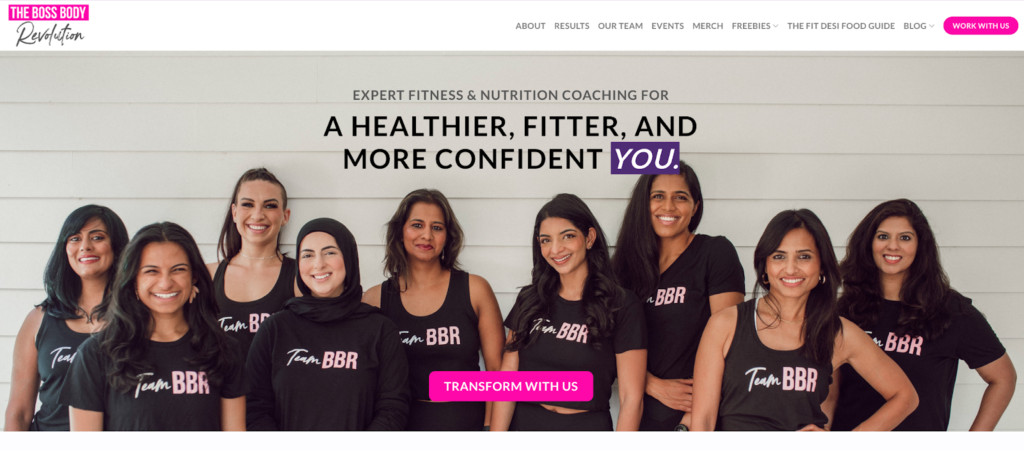
Diksha Gautham is the founder and head coach at the Boss Body Revolution. She provides nutrition and fitness coaching that promises sustainable changes that help South Asian women transform their body and reach their health and fitness goals. Her target audience is demographic-based where she can focus on combining traditional South Asian foods with effective nutrition and fitness strategies.
By defining a clear niche, she attracts South Asian women seeking a culturally inclusive approach to health. Her brand resonates emotionally and builds credibility through educational content, healthy recipes, and client testimonials. She offers tiered coaching programs—1:1 for personalized guidance, group coaching for community support, and a basic package for independent clients.
FAQs About Becoming a Nutrition Coach
How long does it take to become a nutrition coach?
Most certifications take 10–12 weeks, but you can start working with clients as soon as you’re certified.
Do I need a degree to be a nutrition coach?
No, but a certification is recommended for credibility and knowledge.
What’s the difference between a nutritionist and a nutrition coach?
A nutritionist typically has a degree and may provide medical nutrition therapy, whereas a nutrition coach focuses on habit-building and general nutrition guidance.
Can I specialize in specific dietary approaches?
Yes! Many coaches specialize in areas like keto, plant-based nutrition, or gut health.
How do I find my first clients?
Offer free consultations, network with local gyms, wellness centers, and online communities and share client testimonials and success stories.
Can I coach nutrition clients online or only in person?
You can absolutely coach online! Many nutrition coaches run entirely virtual businesses.
Start Your Nutrition Coach Journey
Nutrition coaching can be a personally and financially rewarding career path, whether you’re new to the health space or looking to expand on your existing skills.
By earning a reputable certification, defining your niche, and leveraging tools like Paperbell to manage your practice, you can build a profitable coaching career.










